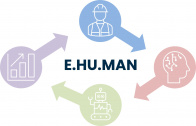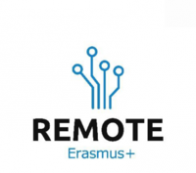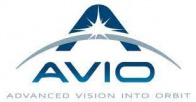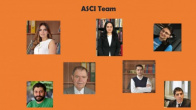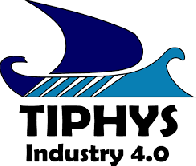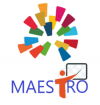Projects
|
|
Bando SWIch - Sostegno alle attività RSI e alla valorizzazione economica dell'innovazione - Programma regionale FESR 2021/2027
This project develops a reliability-based method to estimate the remaining lifetime of used vehicles through a bottom-up approach, starting from individual component failures and aggregating up to the vehicle level. Vehicles are decomposed into functional subsystems and components, each weighted by structural relevance. A percentage of remaining life (PDR) indicator is calculated over mileage and age intervals, providing a probabilistic measure of the remaining life of the vehicle. The method provides a consistent assessment of mechanical durability and supports standardisation in used vehicle valuation. |
| DI-VISION Traceable machine vision systems for digital industrial applications
|
Machine vision systems are crucial to many high-value industries, where Europe is globally competitive, and to the EU objectives for digital transformation and the Green Deal. However, further work is needed to develop digital twins for these systems based on data and physical driven models and the implementation of robust matching and evaluation algorithms for recorded raw data. This will enable the accurate classification of defects or the extraction of geometrical parameters from the surface. In addition, traceability for these systems is also required. The tools developed in this project, combined with uncertainty evaluation methods, will be applied throughout industrial applications on macro- and microscale specimens in order to reach better accuracy, productivity and flexibility as well as improved safety and cost efficiency. Specific Activities: Traceability and Uncertainty of MVSs for application in Aerospace (gears defects), Automotive (cast defects), bioengineering (quality of filling of syringes), cutting (wear of cutting tools of FBR) and tracking system for a digital twin of a cobot. Project coordinator: LNE (France), main partners: University of Maribor (Slovenia), VTT (Finland), POLITO, INRIM (Italy), Università degli Studi di Padova, GE Avio, IGN, CERN, CETIM, GEOMNIA. Funding: The project (23IND08 DI-Vision) has received funding from the European Partnership on Metrology, co-financed from the European Union’s Horizon Europe Research and Innovation Programme and by the Participating States. Website: https://projects.lne.eu/jrp-di-vision/event/. Durata: 01/09/2024-31/08/2027 |
| ADAM Application of Digital-Metrological Twins for emerging measurement technology in advanced manufacturing
|
Advanced manufacturing enables novel design and production techniques for industrial products with complex freeform geometries. It also meets the increasing demand for fast and contactless measurements in industrial quality control using optical sensors. However, current simulation-based methods using Digital-Metrological Twins (D-MTs) to determine measurement uncertainty do not cover such developments in advanced manufacturing. To address this issue, this project will develop reliable model descriptions, accurate mathematical models for use in D-MTs, traceable parametrisation methods for measurement uncertainty evaluation in D-MTs. The project will also optimise the performance of the developed D-MTs for advanced manufacturing applications, as well as producing case studies comparing optical and tactile measurements using complex freeform geometries and guidance for D-MT use in advanced industrial applications. Specific Activities: Development of a Digital Metrological Twin of a Focus Variation Sensor for freeform shape measurement. Project coordinator: PTB (Germany), main partners: VSL (The Netherlands), VTT (Finland), TEKNIKER (Spain), RWTH (Germany), CMI, GUM, LNE, RISE, VTT, DTU, ENS-Paris Saclay, Hexagon, Mitutoyo, Zeiss. Funding: The project (23IND12 ADAM) has received funding from the European Partnership on Metrology, co-financed from the European Union’s Horizon Europe Research and Innovation Programme and by the Participating States. Website: www.adam.ptb.de. Durata: 01/09/2024-31/08/2027 |
| E.HU.MAN Empathically enhanced robot for the collaboration with HUmans in MANufacturing
PRIN 2022 |
E.HU.MAN aims to break new ground in the realm of human-robot collaboration in manufacturing. The project is a synergy of engineering expertise and cognitive neuroscience, bringing together resources from the Quality Engineering Group of Politecnico di Torino and the International Research Center for Cognitive Applied Neuroscience (IrcCAN) of Università Cattolica di Milano, led by Professor Balconi Michela. The primary objectives of the E.HU.MAN project are threefold:
The collaboration between Politecnico di Torino and Università Cattolica di Milano highlights the value of interdisciplinary research, gently merging engineering skills with insights from psychophysiology and cognitive neuroscience. This blend of knowledge aims to enhance the understanding and efficiency of how humans and robots interact in manufacturing environments. |
| Trustworthy virtual experiments and digital twins (ViDiT)
European Partnership on Metrology, EURAMET |
The use of virtual experiments (VEs) and digital twins (DTs) in metrological applications (e.g. coordinate measuring machines (CMM), tilted wave interferometer (TWI), flow measurement (FLOW), nanoindentation, 3D robotic measurement, electrical measurement) requires uncertainty evaluation methods, as well as reliable validation procedures, to make them fit, e.g. as substitutes or extensions, to certified measurement devices. This project will develop these methods and procedures to ensure the reliability and trustworthiness of VEs and DTs in metrology. In addition, this will enable the traceability of modern measurement systems and it will boost and strengthen the European lead in this field. To facilitate the uptake of the developed methods by NMIs/DIs and industrial stakeholders, three good practice guides (GPGs) will be written, and the applicability of the methods. Specific activities: leader of work package devoted to uncertainty evaluation of digital twin, development of digital twin for nanoindentation. Project Coordinator: PTB (Germany), main partners: POLITO, VSL (The Netherlands), LNE (France), ENS-Paris Saclay (France), VTT (Finland), IDEKO, Tekniker, Universidad Politecnica de Madrid, FFII (Spain), Università degli Studi di Padova (Italy) Funding: The project (22DIT01 ViDiT) has received funding from the European Partnership on Metrology, co-financed from the European Union’s Horizon Europe Research and Innovation Programme and by the Participating States. |
| Traceability for indentation measurements in Brinell-Vickers-Knoop hardness (TracInd BVK-H)
|
Hardness is an important material property determined by measuring an indentation size realised on the tested material surface in the Brinell, Vickers and Knoop (BVK) scales. This project will investigate the indentation measurement phenomena to provide a better defined, more consistent, unified and reliable measurement and traceability methodology to overcome the inconsistency between NMIs and lower levels of indentation (hardness) measurements as well as between NMIs. The project outcomes will be used in the next generation of hardness definitions, instrumentation and standardisation to improve the accuracy of material testing in all engineering fields, including aerospace, automotive, health, industry, and research and development. Specific activities: measurement and automatic identification by surface topography measurements of indentation Project Coordinator: Tubitak-UME (Turkey), Main Partners: PTB (Germany), INRiM (Italy), University of Zagreb (Croatia), POLITO, CMI (Czech Republic) Project Funding: The project (22RTP01 TracInd BVK-H) has received funding from the European Partnership on Metrology, co-financed from the European Union’s Horizon Europe Research and Innovation Programme and by the Participating States |
| Made in Italy – Circular and Sustainable (MICS)
Piano Nazionale Di Ripresa E Resilienza (PNRR) |
Specific activities: Advanced surface characterisation of mechanical and topographical properties for leather (understanding effect and support development of green, circular and sustainable tanning – SOLARIS project) and for antibacterial advanced filters and membranes (NANOSUSTECH). Funding: This study was carried out within the MICS (Made in Italy – Circular and Sustainable) Extended Partnership and received funding from the European Union Next-GenerationEU (PIANO NAZIONALE DI RIPRESA E RESILIENZA (PNRR) – MISSIONE 4 COMPONENTE 2, INVESTIMENTO 1.3 – D.D. 1551.11-10-2022, PE00000004). |
| NODES
Piano Nazionale Di Ripresa E Resilienza (PNRR) |
The Spoke 7 “Secondary agroindustry” has the aim of innovating the food system in Northwestern Italy by making companies more competitive in local, national and international markets. Specific activities: The research activities of the Quality Engineering and Management Group are on the Spoke 7 “Secondary agroindustry” aim to enhance quality control and traceability in the secondary agri-food industry, focusing on the development and implementation of statistical techniques for quality assessment, optimization of production processes, and the use of Statistical Process Control (SPC) tools. Key activities include the integration of a digital traceability system for product quality data and the adaptation of control charts, sampling plans, and Design of Experiments (DoE) methodologies to meet industry-specific needs. Expected outcomes include improved product quality, increased customer satisfaction, enhanced traceability, and optimized quality control processes. Funding: This study is part of the project NODES which has received funding from the MUR – M4C2 1.5 of PNRR funded by the European Union - NextGenerationEU (Grant agreement no. ECS00000036). |
| Master in Innovative Manufacturing Systems: MIMS
Erasmus+ Project |
The present EMDM proposal aims to ideate and formulate an envisioned Master in Innovative Manufacturing Systems (MIMS), a unique training and complementary activities proposal designed to provide a multidisciplinary overview of the manufacturing field. Students on this program will have the opportunity to gain knowledge and skills for developing ideas and transform them into innovative solutions, targeting and contributing to the achievement of the sustainable development goals and ultimately a better society. MIMS will be made up of 120 ECTS organised in 4 thematically connected modules, the first three simulating the complete innovation journey, and culminating in the fourth in master’s thesis (MT), which will be an integrative and applied academic outcome that presents flagship solutions to address current and future manufacturing challenges. The dual approach, consisting in teaching/learning and field activities, will be implemented by combining the enormous expertise in technology management and innovation of the three partners (University of Girona, Polytechnic University of Turin and University of Gävle) located in regions (Catalonia in Spain, Piemonte in Italy, and North Middle in Sweden) with high industrial specialisation and long-lasting manufacturing tradition. Students will take advantage of the associated partners, from whom they will have the opportunity to participate in internships and final master projects in 11 different countries in Europe, all of them members of the European Manufacturing Survey consortium. The project-based interactive learning approach with inputs from multidisciplinary sources will give students the chance to further their academic careers and improve their future employability opportunities, while providing European industry with outstanding experts, willing, able and trained to find novel solutions to societal challenges. |
| BLISS - Blended Learning Implementation for reSilient, acceSsible and efficient higher education
Erasmus+ Project |
The current Covid-19 pandemic has forced Higher Education Institutions (HEI) across the world to re-think, in a very short time, their learning strategy. Educational systems have been heavily tested in terms of: (1) availability and use of resources; (2) capability to ensure accessibility for the students. In parallel, the engineering domain has developed futuristic trends connected with the Industry 4.0 vision and key technologies for fast manufacturing and remote working. HEI in the domain of engineering have a twofold challenge in front of them: the alignment of the pedagogical approach and the renewal of the curricula´s content. Blended learning (BL), or hybrid learning, emerged long before the Covid-19 pandemic as a powerful tool to address those challenges identified above. BL is, in short, an approach to education that combines the best of online education and traditional face-to-face interaction with teaching staff. Recently, Covid-19 has accelerated the shift towards hybrid learning approaches by giving a decisive push to an already established trend. The main challenge to implementing BL is its broad definition as a pedagogical approach: the fragmented available literature shows many ways of implementing it, that are often connected with the specific learning outcomes in target and not readily transferable to generic cases |
| REMOTE: Assessing and evaluating remote learning practices in STEM
Erasmus+ Project |
The REMOTE project aims to establish benchmarks for remote assessment of STEM (Science, Technology, Engineering, and Mathematics) courses in higher education institutions (HEIs) in Spain, Italy, and Portugal. As a result of the COVID-19 pandemic, HEIs have had to rapidly adapt to online assessment and remote learning, and the project seeks to provide actionable and user-friendly guidelines for efficient and effective remote learning and assessment practices that can be implemented in different disciplines and contexts. The project also aims to provide a roadmap and sustainability plan to help HEIs deliver and promote the guidelines. The project is innovative in its collaboration between HEIs and External Quality Assurance Agencies and its practical solutions to critical issues in remote assessment. |
| SCAFO 4.0
|
(2022-2023) Consulting activities within the "SCAFO 4.0" project by FINCANTIERI S.p.A., funded by the Ministry of Economic Development and aimed at optimizing the hull production processes through the integration of innovative technologies for monitoring and quality control (link). The commitment includes both theoretical/design activities, as well as training, supervision, and coordination of teams of specialized technicians. |
| Net Shape AM
GE Research Network – E-TDC |
Identification and validation of non-destructive characterization methods for the identification of critical defects in components produced by additive manufacturing for aerospace and aeronautical applications. Specifically, the activity focuses on designing, executing, and analyzing topographic characterizations with optical tools and supporting the correlation of such results with other inspection methods (non-destructive microgeometric (profilometers), non-destructive volumetric (X-CT), destructive tests for mechanical characterization). Project partners:
|
| Towards the Internationalization of the Armenian Science: Armenian Science Citation Index” (20TTCG-5I013)
|
(2020 - 2022) Involvement as an international reviewer, expert in indicators and measures for quality, in the project "Towards the Internationalization of Armenian Science: Armenian Science Citation Index" (20TTCG-5I013), funded by the National Scientific Committee of Armenia (an entity within the Ministry of Education, Science, Culture, and Sports) to CSIAM (Center for Scientific Information Analysis and Monitoring). |
| ECHORD – FREE
|
Partners: Politecnico di Torino, EICAS FREE addressed the sector of small batch production where manual work is still the main manufacturing option since the introduction of automated systems is costly and lacks the necessary flexibility. FREE developed and demonstrated a flexible, safe, accurate, low-cost interactive human-robot environment for small-batch application, achievable by combining robot equipments with the most advanced safety & control technologies (control theory, sensory devices, electronic embedded systems and ICT) for offering to SMEs affordable robotics solutions safe, low-cost and plug & play. Specifically, FREE enabled:
|
| EU Project - Tiphys
Erasmus+ Project |
Partners: POLITO, KTH - Sweden, Università di Napoli – Federico II, University of Ioannina – Greece, UMINHO - Portugal
|
|
EU Project - MAESTRO
Erasmus+ Project |
The aim of this initiative is to bring together excellences in manufacturing research in order to define and deliver the new competences required by future engineers working in the context of the fourth industrial revolution. In doing so particular emphasis is given to the aspect related with a sustainable transition to the digital era. |





